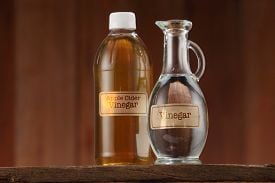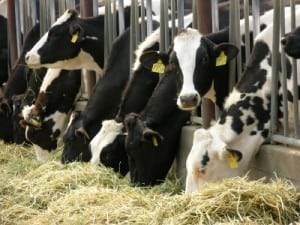Some time ago, I heard an international forum discussion regarding vinegar  from which I gauged that those affiliated to Halaal Certification Bodies are ignorant of the actual Shari’ah ruling regarding vinegar. It seems like they only had the rudimentary information and understanding which is found either in the various Halaal Standards or which they have read off the internet. The result is that, out of ignorance, each one was arguing his point according to his own logic which, in light of the Shari’ah, is a very dangerous thing to do because the Shari’ah has prohibited us from talking about that regarding which we have no knowledge. The Shari’ah has also explained the reason for this prohibition: no-one should unwittingly utter something which could endanger his imaan.
from which I gauged that those affiliated to Halaal Certification Bodies are ignorant of the actual Shari’ah ruling regarding vinegar. It seems like they only had the rudimentary information and understanding which is found either in the various Halaal Standards or which they have read off the internet. The result is that, out of ignorance, each one was arguing his point according to his own logic which, in light of the Shari’ah, is a very dangerous thing to do because the Shari’ah has prohibited us from talking about that regarding which we have no knowledge. The Shari’ah has also explained the reason for this prohibition: no-one should unwittingly utter something which could endanger his imaan.
Due the above, we raised the issue in our weekly Fiqhi meeting and decided that a detailed research paper regarding the views of all four schools of Islamic juristic thought (mazaahib) should be prepared, so that each person – regardless of which school of thought he follows – can be fully aware of the view and proofs of his own school of thought.
Alhamdu Lillaah! This research paper is now complete and ready – May Allah make it beneficial for all of us (aameen).
By: Mufti Yusuf Abdur-Razzaaq, Chief Executive Officer, SANHA Halaal Associates Pakistan
There are numerous Ahadith in which Rasoolullaah has mentioned and praised vinegar.
It has been narrated by Hazrat Jaabir bin Abdullaah that Rasoolullaah once requested one of his wives to give him some gravy to eat. She responded saying that there was nothing besides vinegar which could serve as gravy. Rasoolullaah asked her to give him the vinegar and started eating it with his food. He then said: “Vinegar is wonderful gravy! Vinegar is wonderful gravy!” (1)
There is another narration in which Hazrat Ibnu Abbaas relates from Hazrat Ummu Haani who said: “Rasoolullaah came to our house and was very hungry. He asked me: ‘Do you have anything to eat?’ I replied: ‘I only have a piece of dry bread and I feel too embarrassed to present it to you.’ ‘Bring it!’ he said. I took the piece of bread, sprinkled some salt over it and presented it to Rasoolullaah. ‘Do you have any gravy?’ he asked. ‘I only have a little vinegar’ I replied. ‘Bring it!’ he responded.
When I brought the vinegar, Rasoolullaah poured some of it over the pieces of bread as gravy and started eating. When he was done, he praised Allah and said: ‘Vinegar is wonderful gravy! O, Ummu Haani! No-one will ever go hungry in a house that has vinegar.’” (2)
From the aforementioned Ahadith it has been established that vinegar is Halaal. In fact, it is not only Halaal, it has been called a source of blessings and an excellent gravy.
The Various Methods of Making Vinegar from Wine and Their Rulings
There are three methods by means of which one can make vinegar from wine:
- Wine automatically turns in to vinegar without any action or intent from man.
- Wine turns into vinegar only through the action and intent of man, but without adding anything to the wine.
- Through the action and intent of man, something is added to the wine to make it turn into vinegar.
The Shari’ah ruling of each method is as follows:
- The vinegar which is produced through the first method is Halaal according to the unanimous opinion of all the jurists of all the schools of thought.
- The vinegar which is produced through the second method is Halaal according to the unanimous opinion of all the jurists. However, there is a view in the Hambali school of thought which states that it is not permissible.
- The vinegar produced by means of the third method is Halaal according to the jurisprudence of the Hanafi and Maaliki schools of thought. However, according to the Shaafi’i and Hambali schools of thought, it is NOT considered Halaal.
A Detailed Discussion on the Rulings Regarding Each Method
First Method: Wine automatically turns in to vinegar without any action or intent from man.
When the wine turns into vinegar on its own without anyone intending for it to turn into vinegar and without anyone doing anything to the wine to facilitate the transformation, such vinegar will be Halaal according to all the jurists of all the schools of thought. This process is called “ ???????? “ in Arabic. (3)
Second Method: Wine turns into vinegar only through the action and intent of man, but without adding anything to the wine.
There are 2 views with regards to this method. The first view (permissibility) is held by the majority of the jurists, while the second view (impermissibility) is that of (some) Hambali Jurists.
The View of the Majority of the Jurists – Hanafi, Maaliki and Shaafi’i:
When wine is moved from shade and placed in direct sunlight, or vice versa; and such wine turns in to vinegar, it will be Halaal and permissible according to the jurists of the Hanafi, Maaliki and Shaafi’i schools of thought, despite the fact that the wine was moved with the express intention of turning it into vinegar. However, according to the preferred view of the Hanafi school of thought, if the wine can come into direct contact with sunlight without being moved from its place, it will not be permissible to move it in order to make it vinegar.
Proofs:
The majority of the jurists present those narrations in which vinegar has unconditionally been declared Halaal and a source of blessings as their main argument and proof.
One may object to the view of the Shaafi’i scholars in this method because, if they do not agree with the third method, how can they agree with the second method whereas man’s action and intent play a major role in both. The Shaafi’i scholars answer thus:
In the second method, the property of intoxication which was found in the wine and which rendered it both Haraam and najis, was removed without adding anything to the liquid. As a result, both the container and all its contents became pure and Halaal at once. The same does not occur when one adds something to the contents (as will be explained later).
The View of the Hambali Jurists:
As far as this second method is concerned, the Hambali jurists opine that; if the wine was moved from one place to another due to which it turned into vinegar, whereas there was no intention of turning the wine into vinegar I the first place – it was transferred by-the-way and the change occurred spontaneously – this vinegar will be pure and Halaal. The reason for this is that it changed naturally and automatically without the action or intention of man. However, if the wine was transferred from one place to another with the express intention of turning it into vinegar, two divergent rulings could be applied.
Firstly, it could be regarded as pure and Halaal because the only difference between the two is the intention behind it and intention does not lead to hurmat in the physical properties of anything. Conversely, it could be regarded as both Haraam and impure because, even if there was no intention behind it, the action of man brought about the change from wine to vinegar. This is the same as adding something to the liquid in order to change it. (4)
Third Method: Through the action and intent of man, something is added to the wine to make it turn into vinegar.
This is called takhleel Arabic – when one adds something to the wine in order to change it into vinegar. This includes the action and intention of man, as well. As far as this method is concerned, the Shaafi’i and Hambali jurists hold one view while the Hanafi and Maaliki jurists hold the opposite view. Both views have been mentioned below, together with the relevant arguments and proofs.
- The Shaafi’i and Hambali View:
According to the jurists of both these schools of thought, it is not permissible for a person to intentionally and, by one’s own action, add something to the wine in order to make it vinegar. This includes adding a little vinegar, onion, salt or any other ingredient to wine. It also includes converting the wine into vinegar without adding anything to it, but by means of a specific process. The above-mentioned scholars regard the vinegar produced by either of the two methods as impure and impermissible.
Proofs:
In the Noble Quran, Allah d has instructed us to stay far from wine. In both the above-mentioned methods, instead of staying away from the wine, one has to stay in physical contact with it. Furthermore, one is attempting to change something impure and Haraam into something valuable, which is contrary to the Shari’ah.
In order to prove that this vinegar is impure, the scholars in question cite the proof that when one adds something pure to the wine in order to make it vinegar, the pure ingredient becomes impure the moment it touches the wine. Although outwardly it seems that all the contents became pure when it turned into vinegar, however, since the pure ingredient became impure when it came into contact with the wine, everything once again becomes impure. Thus, the vinegar is impure. (5)
Another proof which they cite is that, when the verse of Surah Maaidah was revealed in which wine was declared Haraam, the Sahaabah j were also given the instruction to destroy all the wine in their possession. (6)
Furthermore, Hazrat Abu Talhah h asked Rasoolullaah g regarding the wealth of some orphans who had inherited wine. Rasoolullaah g told him to destroy the wine. Hazrat Abu Talhah h asked if he could rather just add vinegar to it (thereby making everything vinegar). Rasoolullaah said “No.” (7)
In a Hadith narrated by Hazrat Ibnu Abbaas h it has been mentioned that someone gave a earthen jug of wine as a gift to Rasoolullaah g. Rasoolullaah g asked him: “Don’t you know that Allah d has made wine Haraam?” The man responded in the negative. Thereafter, someone who was standing next to the man whispered something in his ear. Rasoolullaah asked: “What did he tell you?” The man replied: “He advised me to sell the jug of wine.” Rasoolullaah g said: “The Being who made the consumption of wine Haraam has also made selling it Haraam .” Upon hearing this, the man opened both outlets of the container and allowed all the contents to run out. (8)
In light of the above-mentioned Ahadith, the jurists of the Shaafi’i and Hambali schools of thought state that Rasoolullaah never stopped the man from pouring all the wine out in front of him. Had it been permissible to just make vinegar out of the wine, Rasoolullaah would never have allowed the man to pour out and waste the wine. Had it been permissible, he would have simply instructed the man to make vinegar out of it. Therefore, the prohibition of converting the wine into vinegar (by adding something to it) which is found in this Hadith clearly points to the fact that it is Haraam to do so. This is further supported by the fact that it would not have been permissible to waste the wine if there was a permissible way of salvaging or rectifying it in the Shari’ah and Rasoolullaah would have definitely pointed it out. This is especially so when the issue was regarding the wealth and possessions of orphans and the Shari’ah has made it Haraam to squander the wealth of orphans. (9)
The jurists of the Shaafi’i and Hambali schools of thought have also supported their view by citing consensus of the Sahaabah j as proof. They state that Hazrat Umar h once sat on the mimbar and said: “Do not eat vinegar which has been made from wine!” And Hazrat Umar issued this instruction when it was already Halaal to eat vinegar.
These scholars opine that Hazrat Umar’s statement was publicised among the general masses because he sat on the mimbar and made this statement as though announcing a decree and none of the Sahaabah objected to his instruction (which clearly proves consensus). (10)
- The Hanafi and Maaliki View:
The jurists of the Hanafi and Maaliki schools of thought are of the opinion that it is completely Halaal and permissible to add something to the wine and convert it into vinegar. (11)
Proofs:
The scholars of the Hanafi and Maaliki schools of thought state that converting wine into vinegar does not constitute benefiting from wine directly. Instead, it is an attempt to salvage the Haraam wine and change it into something useful. It is permissible to bring about this kind of change in something Haraam. For example: The skin and of a dead animal is Haraam and impure and the Shari’ah has instructed us to stay away from carrion. However, by tanning the skin, it becomes pure and clean and one is now able to derive benefit from it.
This is proven from the Hadith of Rasoolullaah g in which he is reported to have said: “Whichever skin is tanned becomes pure.” In another Hadith, Rasoolullaah is reported to have said: “Tanning a skin purifies it just like vinegar purifies wine.” The latter Hadith clearly indicates that it is permissible to convert wine into vinegar. (12)
There is also another Hadith which proves that it is permissible to do this. Rasoolullaah said: “The best vinegar is that which is made from wine.” In another narration, Rasoolullaah is reported to have said: “Vinegar is a wonderful gravy!” In the aforementioned Ahadith, vinegar has unconditionally been declared Halaal without any differentiation made between that vinegar which was deliberately made out of wine and that which became vinegar of its own accord. (14)
Another proof is that converting the wine into vinegar is synonymous to pouring out and destroying the wine (because the outcome is the same whether you get rid of the wine by pouring all the contents out or by changing it into vinegar). (14) (15)
How Should Wine Turn into Vinegar:
When wine starts changing into vinegar, there is a detailed discussion in Hanafi jurisprudence as to whether it is a condition for all the contents to change into vinegar, whether partial conversion will suffice or whether the conversion of the majority of the wine is necessary.
- Imam Abu Hanifah’s r view:
According to Imam Abu Hanifah, it is a necessary for all the attributes of the wine – especially the bitterness – to completely change into the sharp, acidic flavour of vinegar. If there is even slight bitterness left in the vinegar, it will be impermissible to use it.
Proof:
According to Imam Abu Hanifah, wine does not become vinegar until all the attributes of wine change into the attributes of vinegar. Similarly, he does not consider grape juice to be wine until all the attributes of wine are found in the juice. In short, according to Imam Abu Hanifah, a 100% conversion from wine to vinegar is a condition for the vinegar to be Halaal. (16)
- The View of Imam Abu Yusuf r and Imam Muhammad r:
Imam Abu Yusuf and Imam Muhammad (Saahibayn) hold the view that it is not a condition for all the attributes of the wine to change into the sharp, acidic flavour of vinegar. Instead, if even slight acidity becomes apparent, the wine would be considered vinegar and it will be permissible to use it. Similarly, according to them, the moment the slightest effects of wine become apparent in grape juice, it will be treated as wine. In short, Saahibayn say that it is not necessary for a 100% conversion to occur. This view is the preferred view in the Hanafi school of thought and the fatwa is according to this view. (17)
Modern science also confirms Saahibayn’s view because, according to the latest studies, it is very difficult to determine whether the alcohol (ethanol) has changed completely or not. Furthermore, even after the wine has turned into vinegar, there is still a 0.5% alcohol content. This miniscule amount has been waived and ignored in accordance with the rule: “ ?????? ???????? “ (It is so little that it is treated as non-existent).
Note: Keeping Wine with the Intention of Making Vinegar
There is a difference of opinion among the jurists with regards to the permissibility of keeping wine with the intention of turning it into vinegar. It is permissible according to the Hanafi and Shaafi’ scholars and, accordingly, the resulting vinegar will be Halaal. However, according to the Hambali jurists, it is Haraam to keep wine in order to make vinegar out of it. However, they also agree that it will be permissible for someone who trades in vinegar to keep wine which has already been made, in order to turn it into vinegar so as to protect himself from losing money. (18)
Written by: (Mufti) Arif Ali Shah – 27 Rajab, 1438 / 25 April 2017
Endorsed by:
Members of the Shari”ah Research Department:
SANHA Halaal Associates Pakistan
Mufti Shu’ayb ‘Aalam
Mufti Yusuf ‘Abdur-Razzaaq
Mufti Ahsan Zafar



